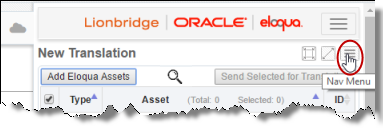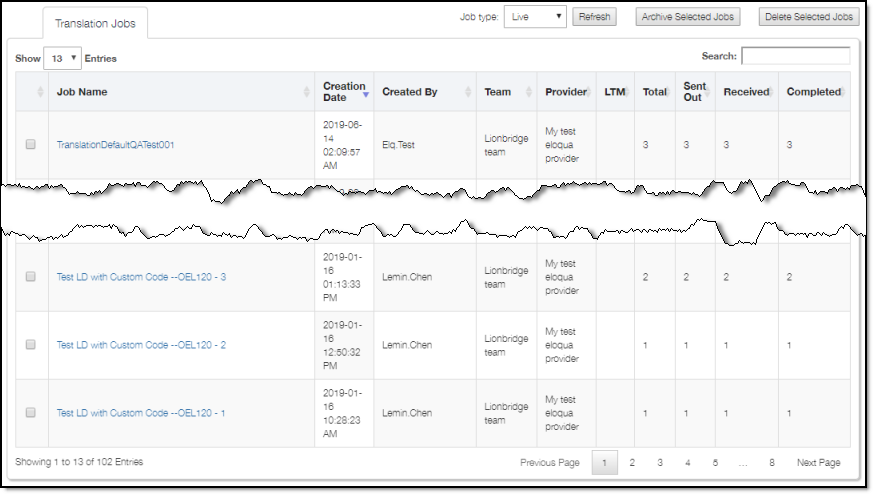Monitoring Translation Jobs
7 minute read
You monitor translation jobs in the Translation Jobs tab.
To monitor translation status:
-
Open the Lionbridge App. For detailed instructions, see Getting Started with the Lionbridge App for Oracle Eloqua.
-
In the App, click the Nav menu button
 to open the menu.
to open the menu.

- In the menu, select Translation Jobs.

Note: If a maximized page in the App is already open, then in the Lionbridge App for Eloqua menu on the left, you can click Translation Jobs to open the maximized version of this page, described below.
By default, the jobs are sorted in reverse chronological order by the Created column, which displays the job-creation date.
The Translation Jobs tab displays the following information about all the jobs you and other team members sent for translation that have not been archived or deleted:
| Column | Description |
|---|---|
| Job Name | The job name, created when you or another team member sent out the job for translation. |
| Created | The date and time when you or another team member sent out the job for translation, in the following format: YYYY-MM-DD hh:mm:ss AM/PM. |
| Total | The total number of assets in this translation job. |
| Out | The number of items in this translation job that the Lionbridge App sent out for translation. Note: There is a separate item for each source and target language pair. For example, if you created a job that sends out a single asset for translation from English to both French and German, then these are two separate items in this tab: English to French, and English to German. |
| Back | The number of items in this translation job that the Lionbridge App received back from translation. |
| Done | The number of items in this translation job for which the translation is complete. Note: If there are items in the job with errors, including Failed Or Rejected status, you can hover over the Error icon  |
- Optional. You can do one or more of the following to facilitate displaying the items you want to see in this tab:
- If there are many items in this tab, it may have multiple pages. The navigation bar below the list helps you navigate through the pages and displays your position in the tab. Click Previous, Next, or a page number to navigate to the corresponding page.
- To sort the items in the tab by a different column, click the corresponding column header.
- To reverse the sort order of a column, click the column header.
- Optional. You can view additional information about each job and filter these items on the maximized version of the Translation Jobs tab:

To open the maximized version of this tab, click the Maximize Window button ![]() .
.
The bottom-left corner below the list displays the number of items displayed in the current tab and the total number of jobs in this tab.
By default, the jobs are sorted in reverse chronological order by the Creation Date column.
The tab displays the following information about all the jobs you and other team members sent for translation that have not been archived or deleted:
| Column | Description |
|---|---|
| Job Name | The job name, created when you or another team member sent out the job for translation. |
| Creation Date | The date and time when you or another team member sent out the job for translation, in the following format: YYYY-MM-DD hh:mm:ss AM/PM. |
| Created By | The username of the user who sent out the job for translation. |
| Team | The team for this translation job, specified when you or another team member sent out the job for translation. |
| Provider | The translation provider to which the Lionbridge App sends this translation job. |
| LTM | Indicates whether the Use Local TM check box was selected when the job was sent out for translation. * If this column displays Yes, then the **Use Local TM** check box was selected when the job was sent out for translation. * If this column is blank, then the **Use Local TM** check box was not selected when the job was sent out for translation. |
| Total | The total number of assets in this translation job. |
| Sent Out | The number of items in this translation job that the Lionbridge App sent out for translation. Note: There is a separate item for each source and target language pair. For example, if you created a job that sends out a single asset for translation from English to both French and German, then these are two separate items in this tab: English to French, and English to German. |
| Received | The number of items in this translation job that the Lionbridge App received back from translation. |
| Completed | The number of items in this translation job for which the translation is complete. Note: If there are items in the job with errors, including Failed Or Rejected status, you can hover over the Error icon  |
- Optional. You can do one or more of the following to facilitate displaying the items you want to see in the maximized version of this tab:
- You can specify how many items to display in a page. Above the top-left corner of the list, select the number to display from the Show X Entries list.
- You can specify which type of jobs to view in the Job type dropdown list:
- Select Live to view all jobs that have not been archived. This is the default view.
- Select Archived to view all archived jobs.
Then click Refresh.
- You can use the Search box above the top-right corner of the list to search for a specific item in the list or to filter the list. As you type into the Search box, the Lionbridge App automatically searches for matches across all columns and displays only the matching items.
Note: The search feature filters all items in the tab, not only those displayed on the current page.
- If there are many items in this tab, it may have multiple pages. The navigation bar below the list helps you navigate through the pages and displays your position in the tab. Click Previous Page, Next Page, or a page number to navigate to the corresponding page.
- To sort the items in the tab by a different column, click the corresponding column header.
- To reverse the sort order of a column, click the column header.
- To update the list of displayed jobs, click Refresh.
- Optional. You can perform the following actions on jobs:
-
You can view additional information about the job, including asset information, source and target languages, and links to the source and target versions. To view job details, click the link in the Job Name column. The Job Details tab opens for this job. For details, see Monitoring Translation Job Details.
-
You can archive jobs so that they will no longer be displayed by default in this tab.
- Ensure that the Live Job type is displayed.
- Select the check boxes for the jobs to archive, and click Archive, or in the maximized version of this tab, click Archive Selected Jobs.
Notes: You can archive a job only if you submitted the job or if you are a site administrator. You cannot archive a job if it has incomplete items. This means that if a job has items that the Lionbridge App sent out for translation and that did not yet return from translation, you cannot archive the job.
Tip: In the maximized version of this tab, you can view jobs after archiving them. In the Job type list, select Archived, and then click Refresh.
- You can un-archive jobs so that they will be displayed by default in this tab.
- Ensure that the Archived Job type is displayed.
- Select the check boxes for the jobs to un-archive, and click Un-archive, or in the maximized version of this tab, click Un-archive Selected Jobs.
Note: You can un-archive a job only if you submitted the job or if you are a site administrator.
You can delete jobs, so that you can no longer view information about them anywhere. Select the check boxes for the jobs to delete, and click Delete, or in the maximized version of this tab, click Delete Selected Jobs.